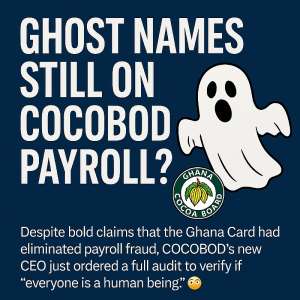
📰 1. Civic Education Article
Beyond the Slogans: The Ghosts Still Haunt Us
When Vice President Bawumia introduced the Ghana Card as a national digital identity solution, it was heralded as a silver bullet for ghost names and payroll fraud. Ghanaians were told repeatedly that this innovation had removed tens of thousands of fraudulent beneficiaries from state rolls. Hope stirred.
Yet the recent revelation from COCOBOD’s new leadership tells a different story.
With over 10,000 people on its payroll and $12 million in monthly wage expenses, COCOBOD’s new CEO, Dr. Ransford Annetey Abbey, has ordered a staff audit to determine if all names are “human beings.” In plain language: ghost names are still very much alive—despite the Ghana Card promises.
🧠 Why This Matters:
Waste of Public Funds: Payroll fraud drains critical resources from sectors like health and education. Failed Digital Integration: The gap between Ghana Card theory and enforcement points to systemic inertia. – Broken Trust: When leaders overstate success and reality says otherwise, civic confidence suffers.
👥 The Civic Lesson:
Ghana’s digital future must be grounded in honest leadership, credible data, and measurable outcomes—not applause lines or election-year optics.
We must ask harder questions of those in power. We must demand regular audits—and public disclosure of findings. Civic trust should not be earned with headlines, but with truth and results.
📱 2. Social Media Exposé (for Facebook, X/Twitter, or Threads)
🕵🏽♀️ GHOST NAMES STILL ON COCOBOD PAYROLL?
📌 Bawumia said Ghana Card removed them all.
👻 But COCOBOD’s own CEO just launched an audit to confirm “if we’re all human beings.”
⚠️ $12 million monthly wage bill. 10,000+ people on payroll. Names no one can verify.
So what happened to the digital promises?
💡 This is NOT about party politics. It’s about:
— Truth 🗣️
— Oversight 📊
— Justice for taxpayers 🇬🇭
🧠 Digital slogans are not reforms. Let’s demand real data, regular audits, and full accountability—no matter who is in charge.
> #GhostNames #GhanaCardRealityCheck #FixTheSystem #LeadershipWithIntegrity
🧾 3. Policy Accountability Brief
Title: Ghost Names and the Digital Myth: A Call for Transparent Reform
To: Leadership of Ghana’s Economic Management Team
Cc: Parliament’s Public Accounts Committee, Office of the Auditor-General, Civil Society Coalitions
🎯 Executive Summary:
Despite public assurances that the Ghana Card system had eradicated payroll fraud, recent statements by COCOBOD’s CEO confirm the ongoing presence of ghost names. This reveals a critical gap between political communication and institutional practice. Public digital reforms must be independently audited, verifiable, and regularly reviewed.
🔍 Key Problems Identified:
1. Overstated Political Claims: Policy victories were announced before the systems had matured.
2. Lack of Verification Mechanisms: Many agencies did not fully integrate Ghana Card verification.
3. Opaque Payroll Systems: Real-time access to staff records is still absent in most state institutions.
4. No Consequences: Past ghost name discoveries rarely led to prosecutions or asset recovery.
📌 Recommendations:
Institutional Audits Every 12 Months — Mandate third-party audits across all public sector payroll systems—with published reports. Independent Ghana Card Impact Assessment — Commission the Statistical Service and civil tech groups to evaluate Ghana Card effectiveness across sectors. Prosecution and Recovery Framework — Where ghost names are discovered, publish culprits and recover funds. Failure to act breeds future fraud. Digital Reform Scorecards — Civil society and media must be empowered to track actual vs. claimed results across all digital governance tools.
🧭 Closing Argument:
Ghana deserves digital transformation that delivers—not deceives.
Let us rebuild public confidence with honest data, equal accountability, and real reform.
💸 “We Are Sitting on Money, Yet Drowning in Hunger”: The Irony of Misused Abundance
When President Akufo-Addo declared “Yɛte sika so, nanso ɛkom de yɛn” (“We sit on wealth, yet we are hungry”) and asserted that “Ghana is not a poor country,” many took it as a call to awaken national pride. But years later, those same words echo back as a haunting indictment—not of poverty, but of leadership failure. If Ghana is indeed rich in resources, then why has public accountability grown poorer?
The crisis isn’t one of scarcity—it is one of stewardship. Billions lost through unchecked procurement, payroll padding, and infrastructure opacity have proven that Ghana’s problem is not lack, but leakage. The President’s truth has become the people’s burden. If we sit on gold and still beg for bread, then the hunger isn’t just in our stomachs—it’s in our systems.
Retired Senior Citizen
Teshie-Nungua
[email protected]


